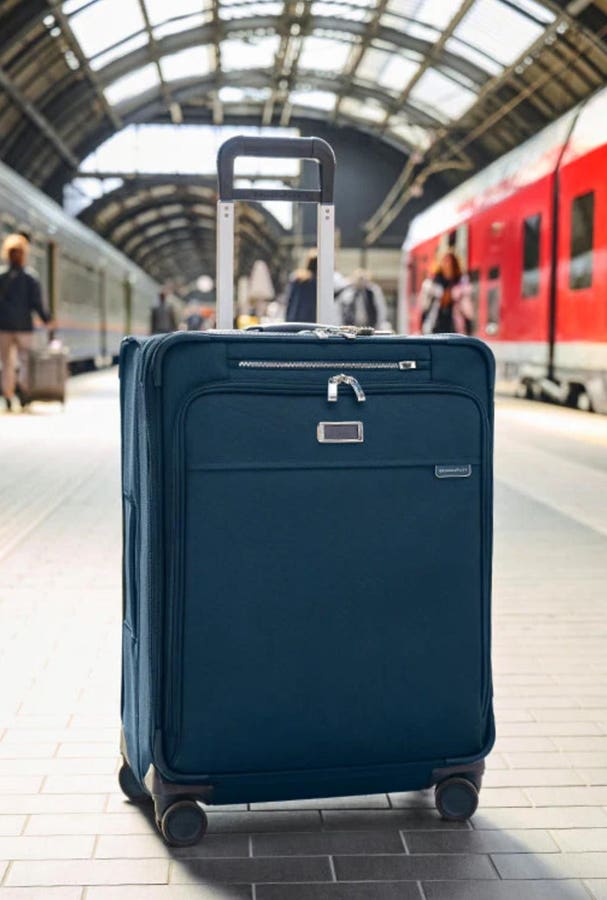Founded in 1993 and based in Hauppauge, New York, Briggs & Riley built its name not on trend or … More
In a world where loyalty is increasingly fragile, the rarest currency is trust.
Today’s consumer has become adept at navigating hollow promises—particularly in travel, where every guarantee seems accompanied by hidden caveats and fine print.
And yet, one brand stands apart in the most tangible, reassuring way: Briggs & Riley, with its legendary “Simple as That” lifetime guarantee.
In an era of rising air travel, soaring luggage mishandling rates, and growing consumer scepticism, Briggs & Riley’s commitment to durability and service has never felt more relevant—or more valuable.
The Pressure on the Modern Traveller
The numbers speak for themselves.
In 2022 alone, over 26 million pieces of luggage were delayed, damaged, or lost—representing a mishandling rate of 7.6 bags per 1,000 passengers globally. That’s a 74% jump from 2021, driven by the resurgence of long-haul and international travel after pandemic restrictions eased.
At the same time, global air traffic has soared.
2024 saw a 10.4% increase in total passenger kilometres flown compared to 2023, and travel now exceeds pre-pandemic levels by almost 4%, according to IATA. Business travel is returning, leisure trips are booming, and existing travellers are flying more frequently than ever before.
More travellers, more luggage, more strain—and more opportunities for things to go wrong.
In this environment, the traditional model of treating luggage as disposable—designed to last a few trips at most—is increasingly out of sync with the way modern consumers live, work, and move.
Delivering A Different Kind of Promise
Founded in 1993 and based in Hauppauge, New York, Briggs & Riley built its name not on trend or marketing bravado, but on a single radical idea:
What if a luggage company genuinely stood by its products for life?
Their “Simple as That” guarantee covers even airline damage—an offer so unusual in a marketplace defined by disclaimers that it felt almost revolutionary.
More than a policy, it became a promise: one that spoke to the frustrations, anxieties, and aspirations of serious travellers.
Where other brands focused on aesthetics or celebrity endorsements, Briggs & Riley innovated meaningfully: developing features like the NXpandable System for more internal space, and the Outsider Handle design to ensure a wrinkle-free packing surface.
Form, yes—but also fundamental function, carefully considered.
Personal Proof: When the Guarantee Matters
Battle-weary – my Briggs & Riley departing on another adventure. In 2022, as international travel … More
I experienced the value of that promise first-hand.
In 2022, as international travel began accelerating once more, I made a investment in a Briggs & Riley suitcase—one that would accompany me on near-monthly long-haul trips across Europe, the Middle East, and the United States. It wasn’t a light decision. Like many professional travellers, I needed reliability, resilience, and reassurance – and it was a considerable purchase decision for me.
Over the years, the suitcase endured everything that heavy, often punishing travel life could inflict.
When, eventually, signs of fatigue appeared, I submitted it for repair—nervous, if I am honest, about what “lifetime guarantee” would really mean in practice.
The experience could not have been clearer or kinder. Within 48 hours after a polite email stating it was easier to replace rather than repair, a new case was delivered. No protracted negotiations, no small-print disputes. Just the fulfilment of a promise made at purchase.
It wasn’t just the speed that impressed me. It was the confidence it restored: the sense that I was genuinely seen and valued, not simply treated as another transaction.
In a world that increasingly feels impatient and impersonal, that matters.
Golden Lessons for Brands Everywhere
Briggs & Riley’s enduring success offers critical lessons that reach far beyond the luggage sector on the importance of delivering on brand promise:
- Substance wins over slogan. Consumers have become adept at detecting hollow marketing. Real value builds real loyalty.
- Service is the silent differentiator. It’s not what happens when the product is perfect—it’s what happens when it isn’t.
- Longevity is the new luxury. Consumers are rethinking what value means. Products that last—and brands that stand behind them—are increasingly prized.
- Trust must be active, not assumed. Lifetime guarantees are not merely about protection; they are powerful psychological contracts between brand and buyer.
The Future of Travel, The Future of Trust
As global travel continues to expand—buoyed by rising middle classes, digital nomadism, and evolving work cultures—the demand for resilience, reliability, and real service will only intensify.
The new luxury is no longer about flash or fleeting trends.
It is about feeling secure, supported, and seen in a world that too often feels transient.
Briggs & Riley’s model isn’t just a testament to smart design or operational excellence. It’s a reminder that in any industry, the greatest differentiator is simple but rare:
Deliver what you promise—and then some.
In a marketplace crowded with noise, consumers are looking for brands they can trust to walk beside them—not just sell to them.
And when they find them, they stay loyal for life.
Read the full article here
